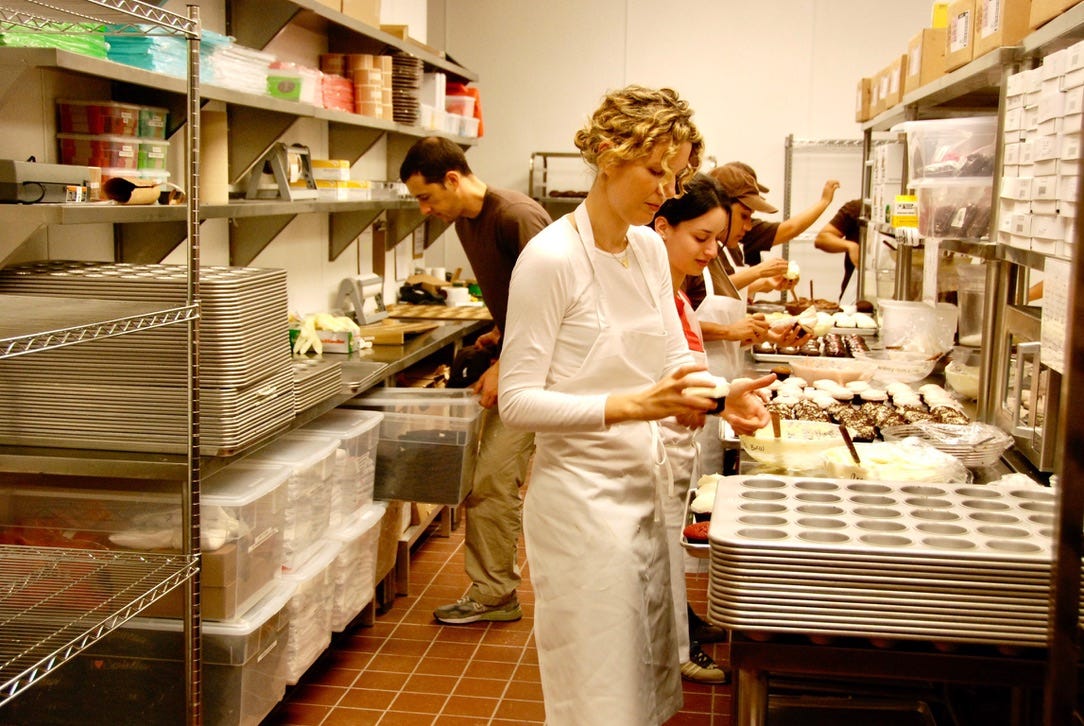It's Not Personal, It's Business (Except When It Totally Is)
Learning to Separate Who You Are from What You Do
They say "it's not personal, it's business" - but anyone who's poured their heart into their work knows it's not that simple! And speaking of personal connections, I've missed our conversations these past few months while I've been on the road speaking to entrepreneurs and women in business (photo above from a recent Visa event for small business owners in San Francisco), growing Pizzana, and preparing for a major keynote in November.
When we last connected, I was sharing the top mistakes I made building Sprinkles. We covered the importance of building a support network and the perils of micromanagement. Today, let's talk about mistake #3: Not Separating Myself from the Business.
Here's the thing about building something from scratch - it becomes your baby. And just like a proud parent, any criticism feels like a personal attack. I remember in the early days of Sprinkles, a single negative comment could send me into a complete tailspin. I cared so deeply about every cupcake that left our bakery that I took each complaint like a dagger to the heart. If we had a great day, I felt on top of the world. But if we messed up someone's order, it completely shook my sense of self-worth.
Take it seriously, not personally.
It got so bad that Charles (my husband and business partner) eventually had to gently suggest that I might not be "front-of-house material." And by "gently suggest," I mean he basically banished me to the back of the bakery! Looking back, it was exactly what I needed.
We're often told as entrepreneurs to "develop a thick skin," but that's easier said than done when your business is such a personal extension of yourself. What I've learned - and am still learning - is that there's a better way to handle criticism than either taking it personally or trying to become emotionally bulletproof.
Here's what helped me:
Reframe criticism as fuel for growth. When customers share feedback directly, they're actually giving you a chance to make things right. The alternative? They silently take their business elsewhere.
Create dedicated feedback channels. Give people a clear way to be heard - whether it's an accessible manager or a responsive customer service system. When feedback comes through channels you've created, it feels less like an attack and more like the business tool it should be.
Look for patterns, not perfection. You can't please everyone (trust me, I tried!). Instead of obsessing over every negative comment, watch for trends. When we opened Pizzana and saw multiple reviews about our prices, it wasn't that our pizza was too expensive - we just weren't effectively communicating what made it special.
Know when to step back. Sometimes the best thing you can do is put someone else on the front lines - someone who can handle complaints with empathy but without the emotional attachment you have as the founder.
Remember your worth isn't tied to your business. This was the hardest lesson for me to learn, but it's crucial: whether your business is thriving or struggling, it's not a reflection of your value as a person. Your worth isn't measured by sales numbers, Yelp reviews, or daily challenges.
The truth is, caring deeply about your business is a superpower - it's what drives us to create exceptional products and experiences. The key is channeling that passion productively rather than letting it consume you.
I'd love to hear how you handle criticism in your business. Do you struggle with taking things personally? What strategies have helped you maintain perspective?
XO,
candace
P.S. I promise not to be a stranger this time! Next month, I'll be sharing some behind-the-scenes stories from my speaking adventures and the unexpected lessons they've taught me.
P.P.S. If you found this helpful, please let me know. Better yet…send it to a friend, too!




Ah, this was just the reminder I needed! Thank you! Your worth is not tied to your success is one of the most important learnings you can have in business. When I used to work in sales, our managers would always remind us, "You are not your number", meaning that no matter what your quota is and no matter if you overachieve or underachieve, it does not change your value at the company or worth as a person. This is serving me now as I venture out on my own! :)
Thank you so much for sharing. You asked how we handle "criticism." I do not look at it as criticism (unless it really is criticism, meaning someone is LOOKING for something TO criticize about). I look at it as constructive feedback and often times I will ask for some constructive feedback because I want to learn and grow as I continue to move forward. Thank you again for sharing :)